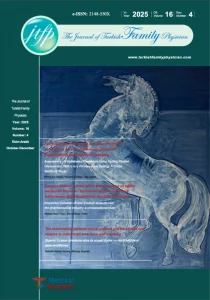Reliability And Validity Of Turkish Version Of Modified Morisky Scale
Introduction and aim: Nonadherence to medications is a common factor that prevents patients from achieving the full therapeutic benefit of their therapies. In the mid- 1980s, Morisky and colleagues developed a brief questionnaire to aid practitioners in prospectively predicting adherence with antihypertensive medications. Subsequently, the instrument was validated in a number of studies and demonstrated to have good psychometric properties. Independent researchers have further expanded the application of this instrument to other chronic diseases and they noted several potential deficiencies.After all,two new questions were added to create the Modified Morisky Scale. The aim of this study is to translate and validate the Modified Morisky Scale to Turkish.
Method: Modified Morisky Scale was translatedinto Turkish versionindividually by three researchers, and it’s determined that Modified Morisky Scale’s Turkish translation of second question was not understood properly. So we changed the second question from negative to positive. The Turkish textwas translated into English by a professional translator. There were no difference between the translated version and the original one. The final version of theTurkish Modified Morisky Scale consisting of six questions was emerged in thirty five sequential patients with chronic illnesses, who were applied to Kocaeli University Değirmendere Family Medicine Polyclinics. The patients were using medicines at least six months and they were executed the scale as pretest/ posttest with one week interval.
Results: 23 women, 12 men participants’ ages means were 61,91(=SD 9,75). Between pretest and posttest there were statistically no significant difference. (p>0,05)
Discussion and Conclusion: Turkish Modified Morisky Scale is short, easy, practical, which can appraise individually motivation and level of the knowledge and confidential test. It’s concluded that it would be useful to assess adherence to long term pharmacological treatment of chronic illnesses in primary care.
References
- Sabaté E, WHO AdherencetoLongTermTherapies Project, Global AdherenceInterdisciplinary Network, World HealthOrganization. Dept. of Management of NoncommunicableDiseases. Adherencetolong-termtherapies : evidenceforaction. Geneva: World HealthOrganization; 2003.
- Morisky DE, Green LW, Levine DM. Concurrentandpredictivevalidity of a self-reportedmeasure of medicationadherence. MedCare. 1986 Jan;24(1):67-74.
- Knobel H, Alonso J, Casado JL, Collazos J, Gonzalez J, Ruiz I, et al. Validation of a simplifiedmedicationadherencequestionnaire in a largecohort of HIVinfectedpatients: the GEEMA Study. AIDS. 2002 Mar 8;16(4):605-613.
- Gregoire JP, Moisan J, Guibert R, Ciampi A, Milot A, Gaudet M, et al. Determinants of discontinuation of newcourses of antihypertensivemedications. J ClinEpidemiol. 2002 Jul;55(7):728-735.
- Ren XS, Kazis LE, Lee A, Zhang H, Miller DR. Identifyingpatientandphysiciancharacteristicsthataffectcompliancewithantihypertensivemedications. J ClinPharmTher. 2002 Feb;27(1):47-56.
- Matthees BJ, Anantachoti P, Kreitzer MJ, Savik K, Hertz MI, Gross CR. Use of complementarytherapies, adherence, andquality of life in lungtransplantrecipients. HeartLung. 2001 Jul-Aug;30(4):258-268.
- Pratt RJ, Robinson N, Loveday HP, Pellowe CM, Franks PJ, Hankins M, et al. Adherencetoantiretroviraltherapy: appropriateuse of self-reporting in clinicalpractice. HIV ClinTrials. 2001 Mar-Apr;2(2):146-159.
- Gao X, Nau DP. Congruence of three self-reportmeasures of medicationadherenceamong HIV patients. AnnPharmacother. 2000 Oct;34(10):1117-1122.
- Sen SS, Thomas J, 3rd. Assessment of a patient-basedpharmaceuticalcarescale. Am J HealthSystPharm. 2000 Sep 1;57(17):1592-1598.
- Miller NH. Compliancewithtreatmentregimens in chronicasymptomaticdiseases. Am J Med. 1997 Feb 17;102(2A):43-49.
- Simpson SH, Johnson JA, Farris KB, Tsuyuki RT. Development andvalidation of a surveytoassessbarrierstodruguse in patientswithchronicheartfailure. Pharmacotherapy. 2002 Sep;22(9):1163-1172.
- Case Management AdherenceGuideline. June 2006:162.



